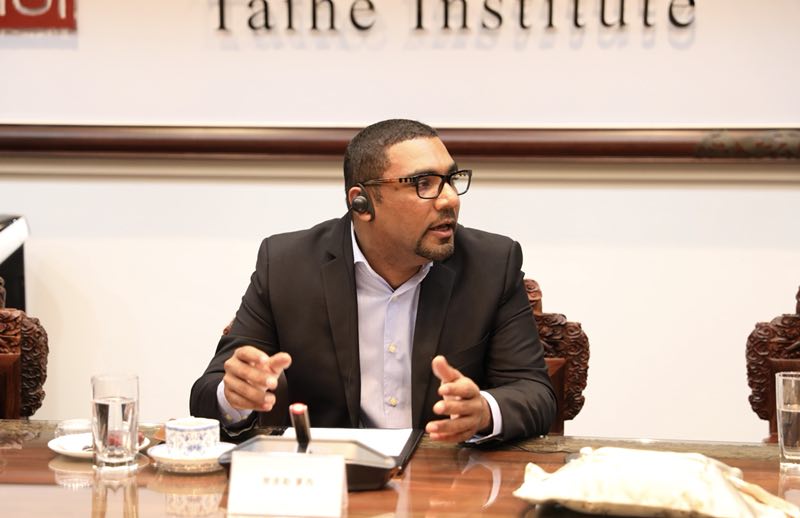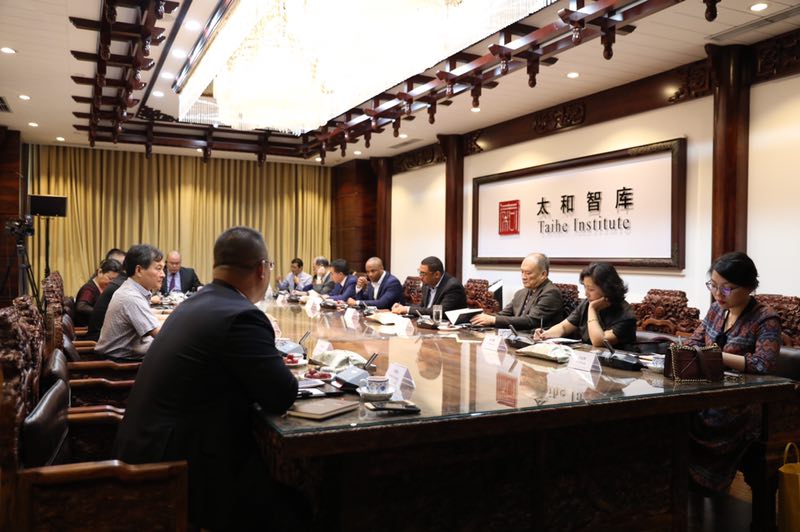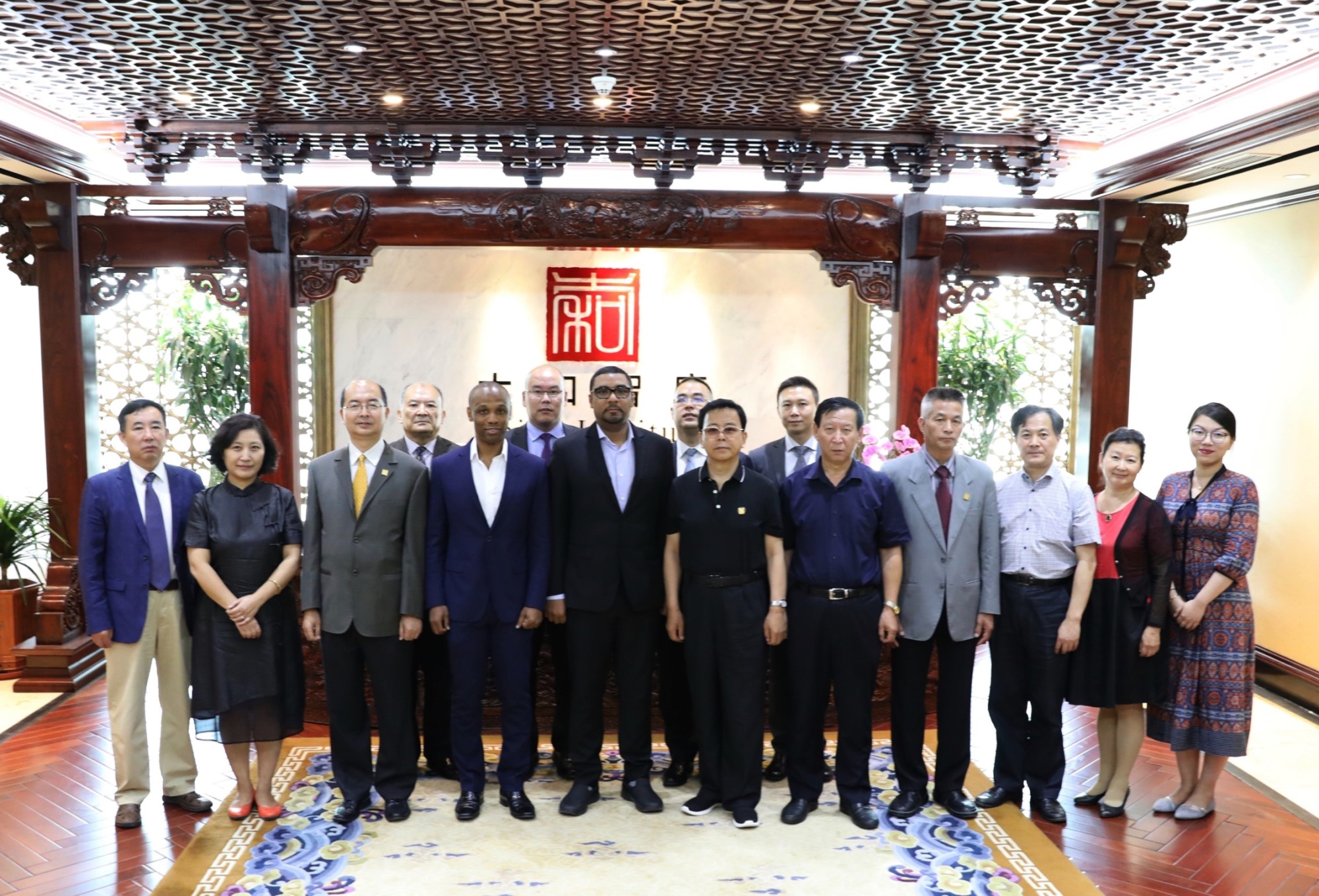On June 4th, 2018, the famous Writer, Publisher, and Chairman of the Kuta Publishing House, Mr. Jamal Al Shehhi of the United Arab Emirates visited Taihe Institute and exchanged opinions on the Belt and Road: New Blue Sea—the Industrialization Practice of Cultural Exchanges between China and the United Arab Emirates with the researchers of Taihe Institute and the experts from China’s cultural industry.

As for the development of the publishing industry in the UAE, Mr. Jamal believes that as the birthplace of Islam, Christianity and Judaism, the current turmoil in the Middle East is closely related to cultural identity and cognition. The UAE has a complex social demographic structure with diverse cultural formalities. For the UAE, language is an important link to enhance identity apart from religion. The official language of the UAE is Arabic, and English is its business language. The government of the UAE attaches great importance to the protection of Arabic. As one of the countries with the best economic performance in the Gulf area, the UAE thinks highly of cultural exchanges with foreign countries, in which the publishing industry plays quite an important role. The publishing industry in the UAE has started late, but the government attaches great importance to it. Especially in recent years, with the opening of the publishing industry to private enterprises and individuals, the publishing industry in the UAE has achieved great progress. For the cooperation in the publishing industry between China and the UAE, Mr. Jamal believes that currently there are three main difficulties. The first is the restriction of policies and laws. For example, in the Middle East, some books involving politics and religion will face more stringent censorship and control. The second refers to problems in translation. For instance, there exist certain difficulties in the translation of Chinese books, though Arab countries have a natural love for China both culturally and psychologically. Many books about China issued in the Middle East are translated from their English versions in the United States and Europe. The third is the lack of understanding of the demand. There is great potential for cooperation in the cultural industry between China and the UAE, but we don’t know the demand of each other’s people well, which has also led to a lack of confidence in investment cooperation.

The participating Chinese guests believe that cultural exchanges between China and Arab countries have entered a new era. In recent years, China’s cultural industry has begun to show up in the Middle East. However, viewing the overall cultural market, American and European cultural products are still the mainstream, and Turkey and South Korea have accomplished great achievements in the cultural market expansion in the Middle East after years of operation. In contrast, the expansion of Chinese cultural industry in the Middle East market still has much space and potential to be excavated. Viewing from the perspective of demand, Arab countries are very interested in the experience of China’s rapid development, especially the elites, who believe that the power of the rise of China is derived from the culture and are quite eager to learn from the Chinese culture. At the same time, the Arabs are also fond of and interested in China’s rich and colorful traditions and modern culture. In the future cultural exchanges with Arab countries, China needs to do a good job in the following aspects: first, the government should strengthen the planning, guidance and top-level design to create sound conditions and environment for Chinese cultural enterprises to go global and introduce excellent foreign cultures to China; second, the government should take market demand as the guidance, seek truth and pragmatism, pay attention to the commercialization of the cultural products and the marketization of the cultural industry, foster a batch of pioneering enterprises that are truly committed to the international cooperation in cultural industry, so as to create excellent cultural programs and set up good examples; third, in terms of the form of cultural products, attention should also be paid to the production and development of games, movies, TV series and other products with images and sensory shocks besides text books; fourth, we should focus on the future, develop cultural products for children and teenagers to enhance their understanding of China; fifth, we need to build a team of international professionals, especially translation talents, of whom the training needs to be speeded up; sixth, cooperate with those who possess advantageous local resources of Arab countries, and plan, produce, and develop together with them.

China is on the rise, and in this process, vigorously developing the cultural industry and unremittingly improving international competitiveness is an important way to help us have a greater say in international affairs. In the meantime, it is also the intended meaning of the construction and development of the “Belt and Road” initiative in the new era. Taihe Institute will always aim at promoting the exchanges and mutual learning among world civilizations, building up a broader platform and exploring more diversified channels, and actively participating in and promoting cultural exchange activities between China and foreign countries.
—————————————————————
FOCUS ON CONTEMPORARY NEEDS.
Should you have any questions, please contact us at public@taiheglobal.org